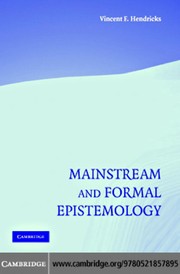Mainstream and Formal Epistemology by Vincent F. Hendricks - ISBN 0521857899 - Cambridge University Press 2006
Motivation
Wanting to explore OwnConcepts#AlgorithmicEpistemology and thus found chapter 7 Computational epistemology. Hopefully a way to progress in my EpistemologicalModel in general and to improve AlgorithmicEpistemology in particular.
Pre-reading model
Draw a schema (using PmGraphViz or another solution) of the situation of the area in the studied domain before having read the book.
Reading
- 1 Introduction to Template
- outlook of the book with figure 1.1. "Epistemologies covered in this book and the chapters in which they are discussed."
- basically from the more mainstreams (first chapters) to the more formal (last chapters) and ending with the author own's proposal
- 2 Priming the pump
- "Forcing is more of an heuristic principle than an epistemological thesis proper:
- Whenever knowledge claims are challenged by alleged possibilities of error, the strategy is to show that the possibilities of error fail to be genuine in the relevant sense." (p9)
- "One may avoid error while at the same time not necessarily gain truth." (p29)
- "A perspective on scientific inquiry is a third-person perspective if it considers what an agent could solve, could do or defend given the best means for an end independently of the epistemic environment he is sunk into." (p34)
- one could then wonder about the anthropocentric bias and if an abstraction of science would improve the situation
- yet it most likely would have its own bias, including anthropocentric if created on inherited by humans researchers
- 3 Mainstream
- Gettier, probability, being correct enough in the current world, frequentism
- 4 Counterfactualism
- 5 Contextualism
- mention of modal tableaux (p70), discovered recently on a Stanford page on logic
- 6 Logical epistemology
- KK thesis, autoepistemology, second-generation logical epistemology, game theory, ...
- 7 Computational epistemology
- 8 Modal Operator epistemology
- 9 Plethoric epistemology
See also
Overall remarks and questions
Synthesis
So in the end, it was about X and was based on Y.
Critics
Point A, B and C are debatable because of e, f and j.
Vocabulary
(:new_vocabulary_start:)
new_word
(:new_vocabulary_end:)
Post-reading model
Draw a schema (using PmGraphViz or another solution) of the situation of the area in the studied domain after having read the book. Link it to the pre-reading model and align the two to help easy comparison.
Categories
Back to the Menu
 Fabien Benetou's PIM
Fabien Benetou's PIM






